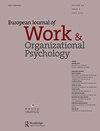完美主义和日常工作中的认知行为过程:对自我相关感知和情绪的影响
IF 3.4
2区 心理学
Q2 MANAGEMENT
European Journal of Work and Organizational Psychology
Pub Date : 2023-09-26
DOI:10.1080/1359432x.2023.2256499
引用次数: 0
摘要
与工作相关的完美主义在员工中普遍存在。然而,目前还不清楚完美主义会如何影响员工的日常工作。根据整体特质理论,我们采用动态视角来调查与工作相关的完美主义(即完美主义的努力和关注)的日常波动与员工的日常计划、拖延和工作中的自我责备之间的关系。我们还研究了这些认知和行为与员工的工作自我效能感、羞耻感和内疚感之间的关系。在两个工作周内,78名员工完成了每日调查,评估完美主义的努力和担忧,以及工作中的计划、拖延和自责,以及工作结束时与工作相关的自我效能感、羞耻感和内疚感。对514个工作日的数据进行的多层次路径建模显示,与日常工作相关的完美主义努力与计划呈正相关,与日常工作相关的完美主义担忧与自我责备呈正相关。自责是一种将完美主义与羞耻和内疚联系起来的机制。我们的研究结果表明,这两个完美主义维度与员工在日常工作中的认知、行为和情绪有不同的关系。因此,我们的研究有助于更好地理解为什么完美主义对员工既有利又有害。关键词:完美主义计划拖延自责羞愧内疚披露声明作者未发现潜在利益冲突。数据可用性声明研究参与者没有同意他们的数据将被公开。如有兴趣的研究人员向相应作者提出合理要求,可获得相关数据。我们将从完美主义努力到拖延和自责,从完美主义关注到计划的路径分别添加到我们的模型中,以检查完美主义努力和关注的独特关系(参见Stoeber & Gaudreau, Citation2017)。这种方法与之前的研究一致,提出并找到了与完美主义的努力和关注相关的不同过程和结果的支持(见Flaxman等人,Citation2018;Mohr et al., Citation2022)。本研究中使用的数据是在一个更大的研究项目中收集的。在这个更广泛的数据收集中,我们的目标是调查几个独立的研究问题。上午的调查评估的构念与本研究的研究问题无关。因此,我们只使用了每天中午和工作日结束时的调查数据,没有包括早上的调查数据。由于SRMRbetween的值比较高,表明测量模型在人与人之间的水平上并不适合数据。当使用以个人平均为中心的项目仅在个人水平上指定测量模型时,它显示出与数据的合理拟合,χ2(835) = 1266.16, p < .001, CFI = 0.92, TLI = 0.91, RMSEA = .03, SRMRwithin = .05。因为我们所有的假设都是在个人层面的分析,所以在个人层面的不适当拟合并不会威胁到我们结果的有效性。在不控制结果变量的基线水平的情况下,模型显示与数据非常吻合,χ2(14) = 16.03, p < .001, CFI = 0.99, TLI = 0.97, RMSEA = .02。除去控制变量并不会改变假设检验的结果。本文章由计算机程序翻译,如有差异,请以英文原文为准。
Perfectionism and cognitive-behavioural processes in daily work: Implications for self-related perceptions and emotions
ABSTRACTWork-related perfectionism is widespread among employees. Nevertheless, it is largely unclear how perfectionism might impact employees in their daily work. In line with whole trait theory, we took a dynamic perspective to investigate how daily fluctuations in both dimensions of work-related perfectionism (i.e., perfectionistic strivings and concerns) relate to an employee’s daily planning, procrastination, and self-blaming at work. We also examined relationships between these cognitions and behaviours and employees’ work-related self-efficacy and feelings of shame and guilt. During two workweeks, 78 employees completed daily surveys that assessed perfectionistic strivings and concerns as well as planning, procrastination, and self-blaming during work, and work-related self-efficacy, shame, and guilt at the end of the workday. Multilevel path modelling of data from 514 workdays showed that daily work-related perfectionistic strivings related positively to planning and daily work-related perfectionistic concerns related positively to self-blaming. Self-blaming served as a mechanism linking perfectionistic concerns with shame and guilt. Our findings show that both perfectionism dimensions relate differently to employees’ cognitions, behaviours, and emotions in their daily work. Thereby, our study helps to better understand why perfectionism can be both beneficial and detrimental for employees.KEYWORDS: perfectionismplanningprocrastinationself-blamingshameguilt Disclosure statementNo potential conflict of interest was reported by the author(s).Data Availability StatementStudy participants did not provide consent that their data will be available publicly. Data are available for interested researchers upon reasonable request from the corresponding author.Notes1. We added the paths from perfectionistic strivings to procrastination and self-blaming and from perfectionistic concerns to planning to our model to examine the unique relationships of perfectionistic strivings and concerns, respectively (see Stoeber & Gaudreau, Citation2017). This approach is in line with previous research proposing and finding support for different processes and outcomes associated with perfectionistic strivings and concerns (see Flaxman et al., Citation2018; Mohr et al., Citation2022).2. Data used in this study has been collected within a larger research project. Within this broader data collection, we aimed at investigating several separate research questions. The morning survey assessed constructs that are not relevant for examining this study’s research question. Therefore, we only used daily data from the noon and end-of-workday surveys and did not include data from the morning surveys.3. As the comparatively high value for the SRMRbetween indicates, the measurement model does not fit the data well at the between-person level. When specifying the measurement model only at the within-person level using person-mean centred items, it shows a reasonable fit to the data, χ2(835) = 1266.16, p < .001, CFI = 0.92, TLI = 0.91, RMSEA = .03, SRMRwithin = .05. Because all our hypotheses are at the within-person level of analysis, the inadequate fit at the between-person level does not threaten the validity of our results.4. Without controlling for the baseline levels of the outcome variables, the model shows a very good fit to the data, χ2(14) = 16.03, p < .001, CFI = 0.99, TLI = 0.97, RMSEA = .02. Removing the control variables does not change the results with respect to the hypotheses tests.
求助全文
通过发布文献求助,成功后即可免费获取论文全文。
去求助
来源期刊
CiteScore
8.00
自引率
2.30%
发文量
40
期刊介绍:
The mission of the European Journal of Work and Organizational Psychology is to promote and support the development of Work and Organizational Psychology by publishing high-quality scientific articles that improve our understanding of phenomena occurring in work and organizational settings. The journal publishes empirical, theoretical, methodological, and review articles that are relevant to real-world situations. The journal has a world-wide authorship, readership and editorial board. Submissions from all around the world are invited.

 求助内容:
求助内容: 应助结果提醒方式:
应助结果提醒方式:


